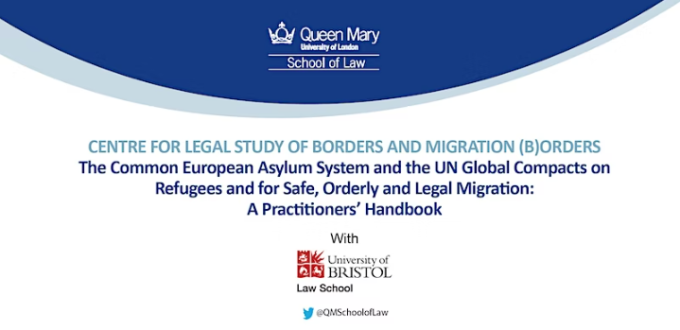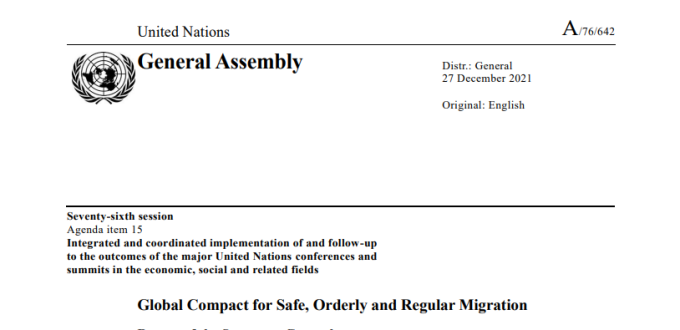Every year, more than a million asylum applications are lodged worldwide. In 2021, a total of 1.4 million claims were made, 648 thousand of which were in the European Union, but only a fraction of these will eventually lead to protection. In 2021, 22% of first instance decisions in the EU granted refugee status; another 17% granted other protection statuses. If […]
A Novel Approach to EU Asylum Law
This Practitioners’ Handbook on the Common European Asylum System (CEAS) and EU and Member States’ Commitments under the UN Global Compact on Refugees and the UN Global Compact for Safe, Orderly and Regular Migration identifies CEAS provisions which fulfil the Compacts’ requirements as well as those that diverge therefrom. Through this exercise, the Handbook highlights […]
Never let anyone tell you that you can’t make a difference: UK civil society organisations challenge
The news has been welcomed by human rights groups and organisations as a victory both for people seeking sanctuary and democratic institutions in general. If the news may offer a momentary sense of relief, this only represents half of the story. The Nationality and Border Bill of Priti Patel The episode stands against the background […]
COMPARING THE DISCOURSE REFUGEES AND MIGRANTS IN EUROPE ACROSS TRADITIONAL AND SOCIAL MEDIA
We analyzed ~16 million social media posts (Twitter, Youtube and Reddit) and ~2 million news articles across nine different languages (English, Spanish, German, French, Italian, Dutch, Swedish, Danish and Polish). The posts were selected using similar query criteria. We dissected the discourse along two dimensions. First, we identified specific themes present across the different language […]
Can Russians refusing to perform military service claim asylum under EU law?
As Professor Elspeth Guild and I discuss in a recently published PROTECT Policy Brief, in both international refugee law and in EU law, people fleeing punishment or persecution for seeking to avoid conscription to fight in a conflict in which war crimes are taking place are entitled to seek and enjoy protection as a refugee. […]
The Common European Asylum System and the UN Global Compact for Safe, Orderly and Regular Migration
When: Tuesday, 27th September 2022, 17:00 – 19.00 hrs Where: Room 3.1, Lincoln’s Inn Fields, Centre for Commercial Law Studies, Queen Mary University of London or online (register here) The (B)OrderS: Centre for the Legal Study of Borders and Migration at Queen Mary University of London (QMUL) and the Centre for International Law at the University of Bristol invite you to […]
PROTECT AS PART OF THE UNHCR GAIN-NETWORK
PROTECT’s project leader, Hakan G. Sicakkan has initiated the University of Bergen’s partnership with the UNHCR – the UN Refugee Agency and membership in the GAIN-network during the first Global Refugee Forum in 2019, when the network was launched. The Global Academic Interdisciplinary Network (GAIN) was established by the Global Compact on Refugees, affirmed in […]
Recordings and policy recommendations available from the Inclusive Europe Policy Roundtable
The policy roundtable, based on findings from ten H2020 projects, looked at “Migrations and migrants in the EU: changing narratives – modifying practices – influencing policies”. The recordings from #InclusiveEurope2022 are now available on YouTube. Visit our channel to watch them. Otherwise, you can find the main proceedings of the roundtable summarized in the following […]
The legal effects of a non-binding instrument: the Marrakech Compact, EU development funds, and poli...
Recently, however, our attention was drawn to a leaked 2019 document produced by the European Commission’s legal service, titled ‘The legal effects of the adoption of the Global Compact for Safe, Orderly and Regular Migration by the UN General Assembly.’ This document suggests that the MC has ‘legal effects’ on EU development policy. The document […]
Implementing Migrant Protection? The UN’s Second Report on the Implementation of the Global Compact
In this blog post, Maja Grundler and Elspeth Guild discuss the Report’s approach to monitoring implementation of the MC. They argue that more explicit engagement with the MC’s objectives and detailed provisions, as well as concrete suggestions for actions for achieving, and criteria for measuring, progress should be the focus of future implementation reports. […]









